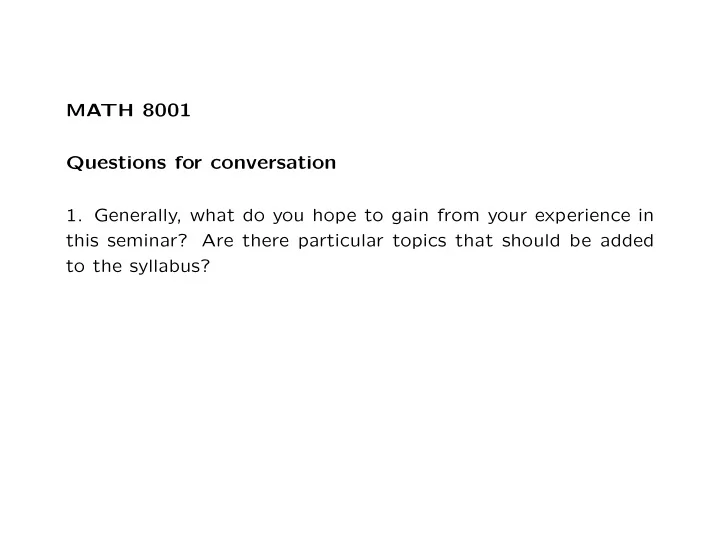

MATH 8001 Questions for conversation 1. Generally, what do you hope to gain from your experience in this seminar? Are there particular topics that should be added to the syllabus?
Notes from article and questions for conversation Boyle, Boice (1998). Systematic mentoring for New Faculty Teachers and Graduate Teaching Assistants. Innovative Higher Education, Vol. 22, No. 3, 157-179. 2. What do you see as the advantages (and disadvantages?) of beginning a formalized peer mentor program for our graduate teaching assistants? What concerns would you have, either as a prot´ eg´ e or mentor?
- One rationale for a formalized program is that natural mentor- ing occurs less often than we might hope. 3. Has anyone experienced here mentoring of an informal variety from peers? Describe.
The most common reasons given for avoiding mentoring pro- grams: - fear that they’ll be used for departmental evaluation purposes - they are viewed as remedial or peripheral to the goal of finishing a PhD - busyness 4. Do these resonate with you? Are there others?
- Cross-department mentor pairings seem to be more effective for new faculty than for graduate students. 5. How is teaching math similar/different from teaching English, say? Physics? 6. Would it be useful to match along common thesis adviser or area of study?
7. What marks the transition of a graduate student from prot´ eg´ e material to mentor material?
8. Should the pairings be in the context of a particular class, for example, assignment of a ”senior TA” in Calc I fall semester? Or, should the pairings aim for a longer-term relationship?
- The article mentioned “differing expectations” as a way a men- tor pair can fail – for example, expecting to use the meetings as a way to express frustrations, or expecting “outside opinion on teaching and not political bull from the department”. 9. This kind of exchange can be healthy or it can be poisonous; how to assess and adjust when a pairing is not working out?
Recommend
More recommend